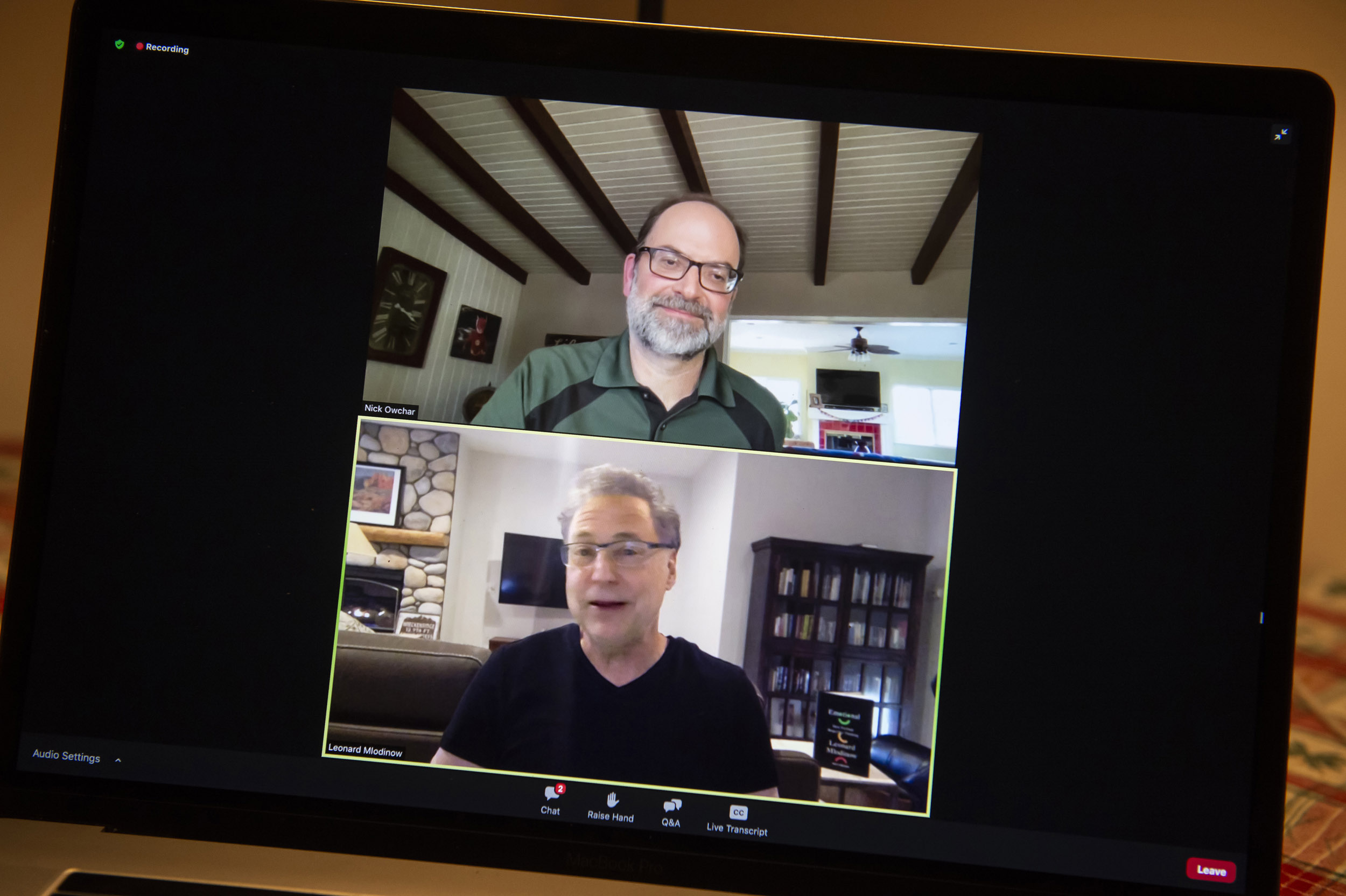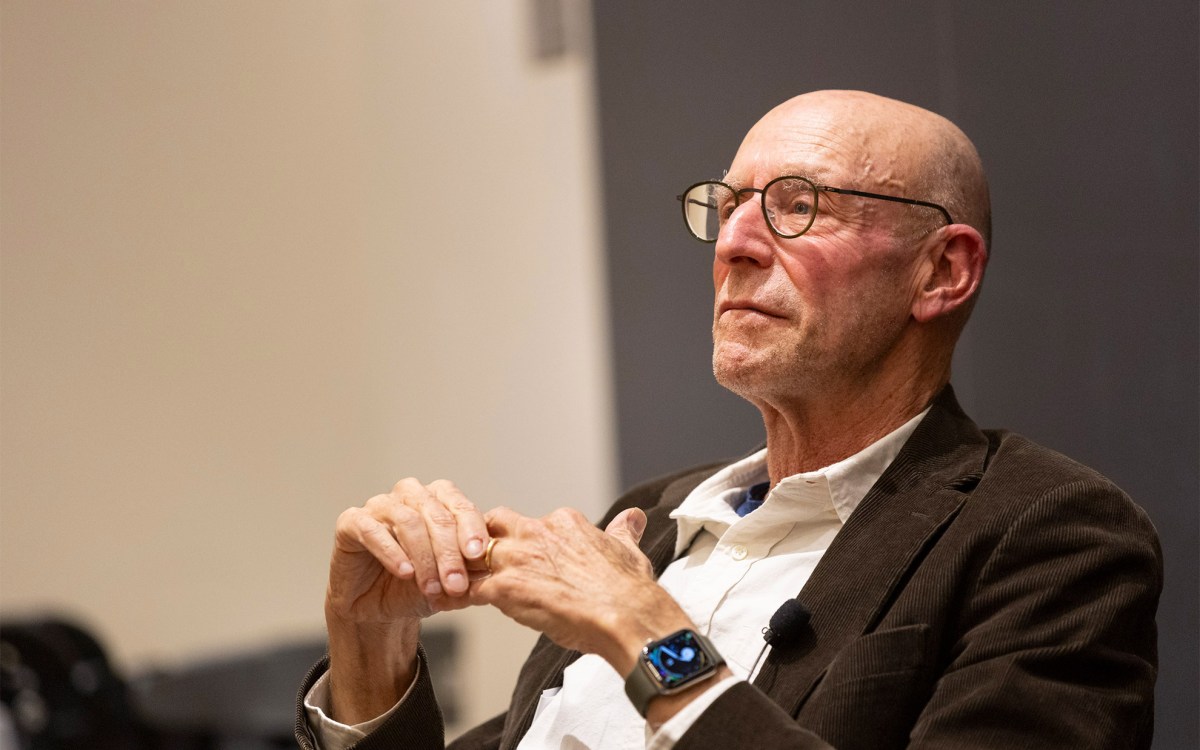
Leonard Mlodinow (bottom), author of “Emotional: How Feelings Shape Our Thinking,” explains the link between logic and emotion. “Even if you think you’re applying cold reason, you’re not,” he tells moderator Nick Owchar (top).
Jon Chase/Harvard Staff Photographer
Logic or emotion: Which is more valuable?
Neither, according to Leonard Mlodinow’s new book, which argues thinking and feeling are inextricably linked
The argument about whether head or heart is more valuable has raged forever. Would you rather possess the clear rationality of the Greek god Apollo or the wild emotion of Dionysus? The cold logic of Mr. Spock from “Star Trek” or the messy humanity of Dr. McCoy?
The answer, according to Leonard Mlodinow, is moot. Why? He argues in his new book, “Emotional: How Feelings Shape Our Thinking,” that the two constitute a kind of false dichotomy because they’re actually inseparable.
“Even if you think you’re applying cold reason, you’re not,” said Mlodinow, who spoke about his book last week in a virtual Harvard Science Book Talk presented by the University’s Division of Science, Cabot Science Library, and Harvard Book Store.
A theoretical physicist by training, Mlodinow spent years on the faculty at the California Institute of Technology but left to write 11 science books, including five best-sellers, plus several episodes of TV shows such as “Star Trek: The Next Generation,” “MacGyver,” and “Night Court,” among others. “Emotional” digs into recent discoveries in neuroscience and psychology — fields entirely different from his own — to explain how feelings, like rage, fear, disgust, and joy, are the unconscious rudders behind all human decision-making.
“Emotions play a hidden role in our behavior,” Mlodinow said. They help the brain choose what sensory information to pay attention to, how to process it, and what other data — such as memories or goals — to weave into decisions. For example, said Mlodinow, when you walk through an unfamiliar neighborhood, fear can amplify the sound of a twig breaking a block away, a sound you might otherwise ignore.
Before jumping into the book’s details, discussion moderator Nick Owchar, executive director of advancement communications at Claremont Graduate University and former deputy book editor of the Los Angeles Times, wanted to know: Why would a theoretical physicist even want to write a book about emotions?
“As a physicist, I’m curious about the universe,” Mlodinow said “How did we get here? How did it get here? Why is it the way it is? I have the same questions as a human: Why am I the way I am? How did we as a species get here?”
We got here, Mlodinow continued, because of emotions. Thousands of years ago, when wild humans roamed the plains and savannas, they were far from the fastest or strongest animals. Alone, they couldn’t survive, so they banded together. And emotions, like empathy, guilt, and shame, evolved to glue these packs together and encourage cooperation.
But in today’s society, emotions frequently don’t lead to anything as productive as cooperation. Just as human eyes can experience optical illusions, Mlodinow said, emotions can malfunction, revving too high or lingering too long, or flaring up in inappropriate situations. To rein things in, Mlodinow recommends a few simple tactics: meditate; express emotions (suppression has been shown to lower life spans, he said); and change the story. For example, when a driver cuts you off, anger might tell you the person is a selfish jerk. But, if you shift the story, telling yourself the person could be dealing with an emergency, you can shift the emotion. “Put a different spin on it,” Mlodinow said.
Emotions can also be contagious, right? Owchar asked.
Right, said Mlodinow. Think about yawns in a classroom or audience laughter in TV sitcoms (when these disappeared during the pandemic, he said he could no longer tell if the jokes were funny). But in the age of social media, where one person can interact with thousands of others expressing intense emotions all at once, this contagiousness can become overwhelming. “We’re not necessarily armed and equipped for that,” he said. “Emotional contagion on that scale can get out of hand. Hate and anger and sometimes fear can magnify and amplify in a way that isn’t necessarily healthy for society.”
Three-quarters through the hour-long discussion, Owchar engaged Mlodinow in a game he called “Plead the Fifth,” in which he asked the author to pick one of two options (or neither and choose not to incriminate himself). These included: computer or yellow paper and pencil (“Computer,” Mlodinow said quickly. “I’m an incessant editor.”); Captain Kirk or Captain Picard (he pleaded the Fifth); and Isaac Asimov or Carl Sagan (Asimov).
To conclude the talk, Owchar asked Mlodinow about his work with fellow theoretical physicist and author Stephen Hawking, with whom he co-wrote two books, “A Briefer History of Time” and “The Grand Design.” Their partnership led to a decades-long friendship, and when Hawking died in 2018, The New York Times asked Mlodinow to write a tribute. How did you write while coping with grief? Owchar wanted to know.
“It was easy, in a way,” Mlodinow said. “I just sat there and felt my emotions. I let it all pour in. It came from the heart. I think that’s how you should write.”





